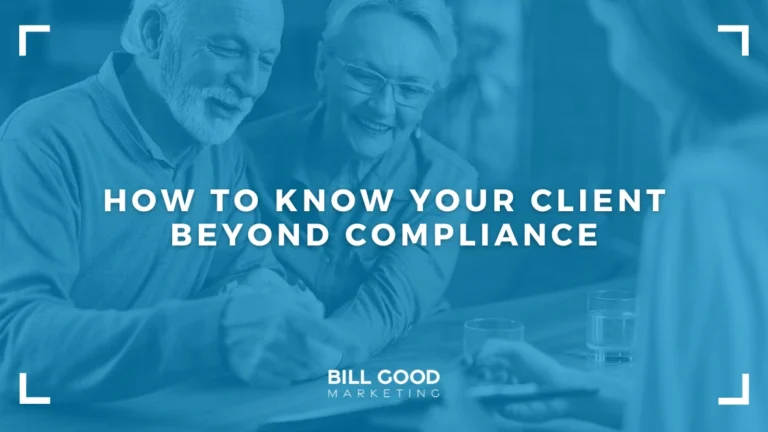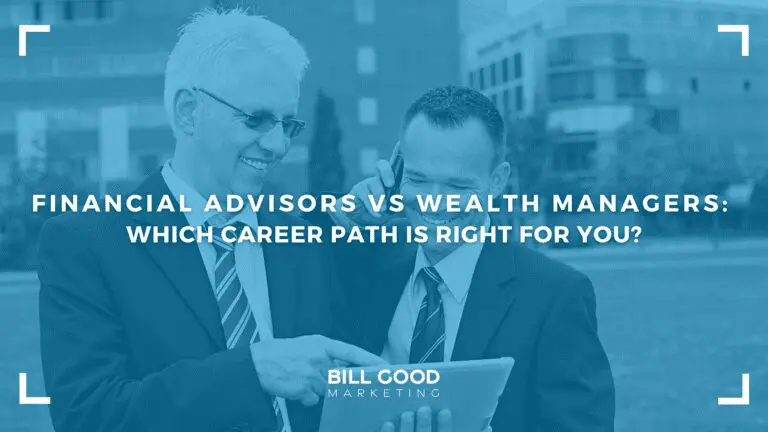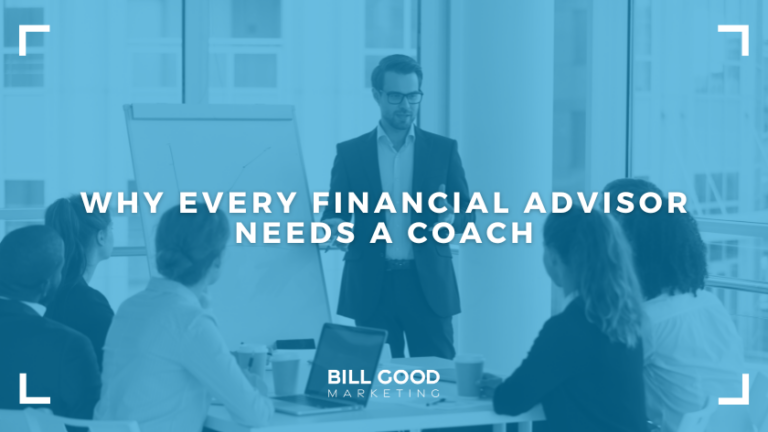Most financial advisors think they know their clients.
They know their date of birth, their risk profile, maybe even where they went on vacation last year.
But here’s the real question: Do they really know them?
Know Your Client (KYC) is more than a regulatory requirement—it’s the foundation of trust, the bridge between transactions and relationships. Yet, in too many cases, it’s reduced to a checkbox exercise, a way to meet compliance requirements and satisfy the Financial Industry Regulatory Authority (FINRA) and the U.S. Securities and Exchange Commission (SEC). Advisors collect the driver’s license, verify the identification number, and move on.
That’s a mistake.
The real power of KYC compliance isn’t in the customer identification program (CIP) or anti-money laundering (AML) checks—it’s in using customer due diligence (CDD) to truly understand who your client is beyond their financial transactions.
- What do they value?
- What keeps them up at night?
- What are they working toward, and what legacy do they want to leave?
This article will show you the difference between knowing a client on paper and knowing them in real life. We’ll cover KYC requirements, the KYC process, and the compliance procedures every financial professional must follow. But more importantly, we’ll go deeper—beyond identity verification and risk assessment, into the world of deep profiling, where the best financial advisors set themselves apart.
Because in this business, the advisors who win aren’t just the ones who check the boxes. They’re the ones who build relationships, anticipate needs, and make clients feel truly understood.
Let’s get started.

The Basics: What is Know Your Client (KYC)?
KYC isn’t just paperwork. It’s the foundation of every client relationship in financial services. The goal? To verify a customer’s identity, assess their risk profile, and prevent financial crimes like money laundering and terrorism financing.
Regulators like FINRA, SEC, and FinCEN enforce KYC compliance to ensure financial institutions follow strict regulatory requirements.
These rules, strengthened by the Patriot Act, help detect and prevent illegal activities, especially in industries handling cryptocurrency and other high-risk financial transactions. Advisors must perform due diligence before engaging in any financial transactions—and it all starts with these key steps:
Customer Identification Program (CIP)
Before an account is opened, advisors must confirm a client’s identity using:
- Driver’s license or government-issued ID
- Date of birth and identification number
- Proof of address (utility bill, bank statement)
Fail to verify identity? No account. No relationship. No exceptions.
Customer Due Diligence (CDD)
Once identified, clients must be assessed for risk. Financial advisors must collect:
- Financial background and investment history
- Risk tolerance and financial objectives
- Business relationship details (employment, ownership stakes)
This step ensures suitability—matching recommendations to the client’s actual financial situation.
Enhanced Due Diligence (EDD)
Some clients pose higher risk—especially politically exposed persons (PEPs) and those flagged on sanctions lists. For these cases, advisors must:
- Perform ongoing monitoring of customer activity
- Verify beneficial owners of business entities
- Document source of funds and major transactions
Failing to conduct EDD can lead to serious penalties and expose firms to illegal activities like terrorist financing.
Ongoing Monitoring & Risk Assessment
KYC doesn’t stop after onboarding. Advisors must:
- Update customer information regularly
- Flag suspicious activity or unexpected financial behavior
- Adjust risk assessments over time
Staying compliant isn’t just about avoiding fines—it’s about building trust and protecting clients from financial harm.
But most advisors stop here. They check the box, file the paperwork, and move on. That’s a mistake.
To build a thriving practice, advisors need to go beyond compliance.
They need to truly Know Their Client—not just on paper, but as a person.
Let’s talk about how.

Going Deeper: What It Really Means to “Know Your Client”
Most advisors think they know their clients. They’ve checked the compliance requirements, verified a driver’s license, confirmed an identification number, and ensured no flags on the sanctions lists.
That’s KYC, right?
Technically, yes. But practically? Not even close.
Because knowing a client isn’t the same as truly understanding them.
Beyond Compliance: The Real Meaning of KYC
The KYC process was designed to prevent financial crimes—to stop money laundering, catch politically exposed persons (PEPs), and identify high-risk individuals before they use the system for illegal activities.
It’s a necessary safeguard.
But if all an advisor does is run a customer identification program (CIP) and complete a customer due diligence (CDD) checklist, they’re missing the real point.
A client isn’t just a risk profile or a financial transaction history. A client is a person. A person with a past, a vision for the future, and a complicated, messy, wonderfully human relationship with money.
And if you don’t understand that? You don’t really know your client.
The KYC Illusion: When Data Replaces Relationships
Financial advisors are drowning in data. Customer information is everywhere—tax returns, investment accounts, proof of address, estate plans.
The problem? Data isn’t knowledge.
- You can track a client’s financial transactions but still have no idea why they’re terrified of running out of money.
- You can review their risk profile but never ask why they hesitate every time you mention long-term investing.
- You can scan for suspicious activity but never uncover the real reason they’re moving assets around.
This is the gap between KYC compliance and true customer understanding. The gap that separates advisors who simply follow KYC procedures from those who build deep, lasting relationships.

Deep Profiling: The Competitive Advantage
Regulatory compliance forces you to verify a customer’s identity. They tell you to collect a driver’s license, identification number, proof of address, and other KYC documents. They make you assess risk profiles, track financial transactions, and report suspicious activity.
But here’s what they don’t tell you:
A client isn’t a form to be filled out. A client is a story to be understood.
And the best advisors—the ones who retain clients for decades, earn referrals without asking, and get invited to family celebrations—go beyond customer due diligence (CDD) to learn what really matters.
The Power of Deep Client Profiling
Imagine two advisors.
One follows the standard KYC process—verifies identity, confirms financials, and assesses risk tolerance. They know their client’s date of birth, investment history, and net worth.
The other does all of that and then some.
- They ask about money mindset—is their client a natural saver, or do they see money as a tool for adventure? What has been their history with money?
- They know what keeps them up at night—market volatility, healthcare costs, their business cash flow, or the fear of outliving their wealth?
- They understand family dynamics—who’s dependent on them, who they trust, who they’d do anything for.
Guess which advisor gets the business and the loyalty?
Deep profiling creates a competitive edge that no regulation can replicate. Because when you truly Know Your Client, you don’t just manage their money—you become an essential part of their life.
Building a Real Client Profile
Going beyond KYC compliance means seeing the client as more than a financial transaction. It means understanding:
Financial Philosophy
What does money mean to them? Security? Freedom? Legacy?
Some clients want to grow their wealth aggressively, others want to protect what they have. If you don’t understand this, you’ll never make recommendations that truly resonate.
Personal Motivations
What drives their financial decisions?
For some, it’s about leaving something behind. For others, it’s about enjoying life now. The best advisors know why a client invests, not just what they invest in.
Life Transitions
What major changes are coming? Retirement, a business sale, an inheritance, a health shift—these events change everything. Financial advisors who anticipate these moments, instead of reacting to them, become indispensable.
Legacy & Giving
What impact do they want to leave? Some clients want to fund scholarships. Others want to help their grandkids buy homes. Some just want to make sure their spouse is okay. Deep profiling uncovers these wishes before it’s too late.
From KYC to a Relationship-Based Business
Here’s the truth:
- Most advisors focus on compliance. The best ones focus on trust.
- Most advisors verify identity. The best ones learn about identity.
- Most advisors manage money. The best ones manage lives, dreams, and futures.
Yes, KYC regulations are essential. But they are not what makes an advisor irreplaceable.
A KYC checklist won’t make you memorable. A deep, human connection will.
The advisors who succeed aren’t the ones who follow compliance requirements—they’re the ones who truly Know Their Client.
That’s how you win. That’s how you build a firm that clients stay with—not because they have to, but because they wouldn’t dream of going anywhere else.
Most advisors do the minimum. The best advisors do what’s necessary.
Let’s talk about how.

5 Steps For Gathering & Using Deep Client Insights
Most advisors collect data. The best ones collect insights.
The difference?
Data is static—a name, a date of birth, a customer’s risk profile neatly entered into a CRM.
Insights are dynamic—a living, evolving understanding of who your client is, what they care about, and what’s coming next in their life.
For over 45 years, our founder, Bill Good has preached one simple truth: “People do business with people they like, trust, and remember.”
That’s why deep profiling has always been a core principle of Bill Good Marketing.
Advisors who only complete KYC checks meet compliance requirements, but they miss the real opportunity—to become indispensable to their clients.
So, how do you shift from customer onboarding to actually knowing your client?
1. Ask the Right Questions (Beyond KYC Requirements)
A customer identification program (CIP) requires you to collect a driver’s license, proof of address, and identification number. But that’s not enough to build a relationship.
Instead, ask questions that uncover motivations, fears, and long-term plans:
- If money weren’t a factor, what would you be doing right now?
- What’s your biggest financial regret?
- What’s something you’ve always wanted to do with your wealth but haven’t yet?
The best advisors don’t just check boxes. They get their clients talking.
2. Use Technology to Track Customer Insights
Bill Good recognized early on that advisors needed a system to manage client relationships, not just transactions. That’s why his approach to deep profiling goes beyond financial transactions and focuses on understanding the whole person.
A client’s risk profile changes. So does their business relationship status, their goals, their health. If you aren’t tracking this, you’re flying blind.
Leverage fintech tools to:
- Keep detailed client notes in your CRM on life transitions, career changes, and legacy planning
- Set reminders to review client information at regular intervals
- Automate insights on their financial transactions and customer activity
Good advisors check in once a year. Great advisors stay ahead of the conversation.
3. Revisit & Refresh Client Profiles Regularly
Too many advisors treat KYC verification like a one-and-done process. They onboard a client, confirm their customer information, and assume they’ve “done the work.”
Here’s what the best advisors do differently:
- They treat customer relationships like an evolving conversation.
- They adjust financial plans based on new goals and risks.
- They don’t wait for the client to bring up concerns—they bring them up first.
Your client’s life isn’t static. Neither should your knowledge of them be.
4. Use Insights to Strengthen Customer Relationships
Most customer onboarding experiences feel the same—forms, disclosures, and risk assessments. But clients remember the advisor who goes beyond that.
- When you know a client loves travel, you send them financial tips for travelers.
- When they care about charitable giving, you introduce tax strategies that maximize their impact.
- When their family grows, you bring up estate planning before they ask.
The best advisors don’t just manage assets. They anticipate needs.
5. Connect Profiling to Business Growth
Deep Know Your Customer strategies aren’t just good for the client. They’re good for business.
Why? Because understanding a client fully leads to:
- Higher retention—Clients don’t leave advisors who truly “get them.”
- Better referrals—Happy clients introduce you to others like them.
- More opportunities—You uncover cross-selling and planning strategies they actually need.

Turn KYC into Your Competitive Edge
Regulators demand that you Know Your Client, but they never tell you what to do with that knowledge. That’s where most advisors fall short. They check the KYC compliance boxes—verify a customer’s identity, assess a risk profile, and monitor financial transactions—but never use that information to create real, lasting relationships.
Bill Good built his system around one guiding principle:
“If you know your client better than anyone else, you’ll always be the advisor they turn to.”
For over 45 years, Bill Good Marketing has helped financial advisors go beyond compliance and turn customer relationships into the foundation of a thriving business. Our approach to deep client profiling ensures you:
- Anticipate your client’s needs before they even ask
- Uncover opportunities that drive growth and retention
- Become the go-to advisor in their financial life
Most advisors gather the minimum. The best advisors turn knowledge into action.
If you want to build deeper client relationships, drive more referrals, and grow a business based on trust, we can help.
Fill out our contact form to learn more about how the Bill Good Marketing system can transform the way you connect with your clients.
Because the advisors who truly Know Their Client? They win—again and again.
About the Author

Andrew D. White is the Director of Marketing at Bill Good Marketing, a firm with over 45 years of experience helping financial advisors scale their businesses. With deep expertise in advisor marketing, client acquisition, and retention strategies, Andrew specializes in creating high-impact campaigns that drive measurable results. His insights are grounded in real-world experience, working alongside top-performing advisors to refine prospecting, branding, and practice management strategies.




